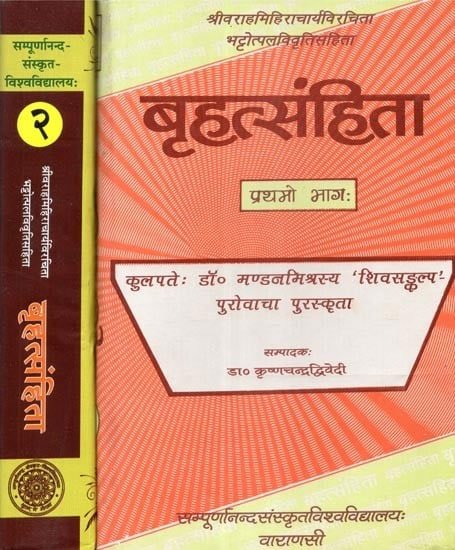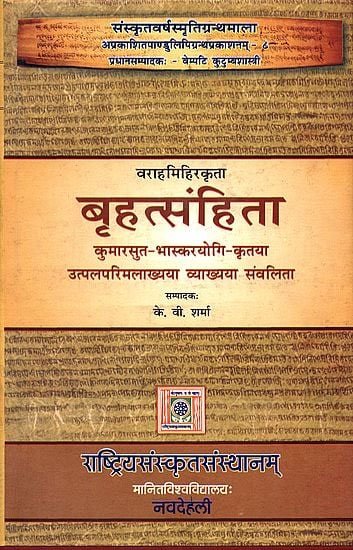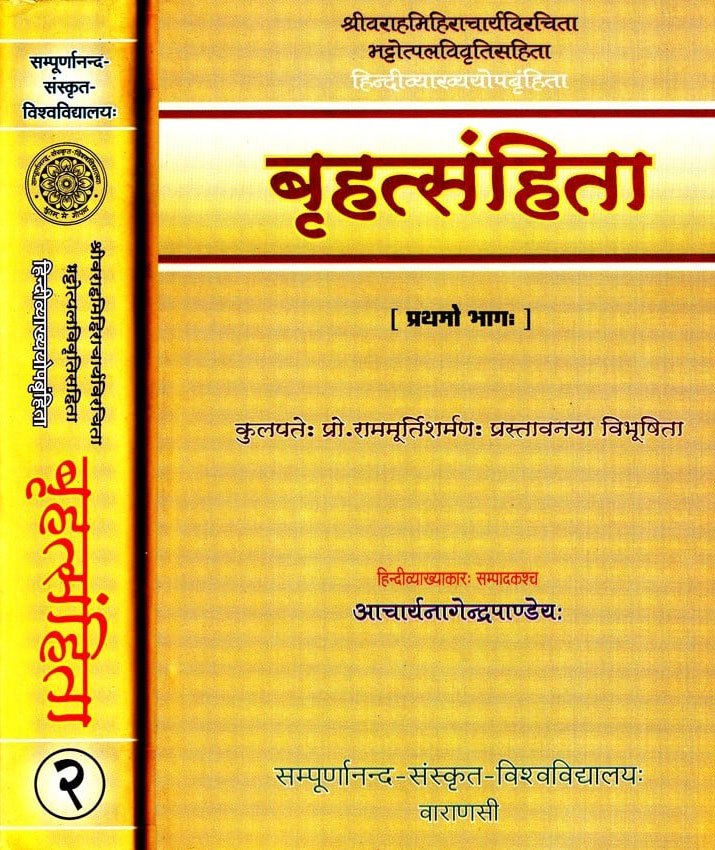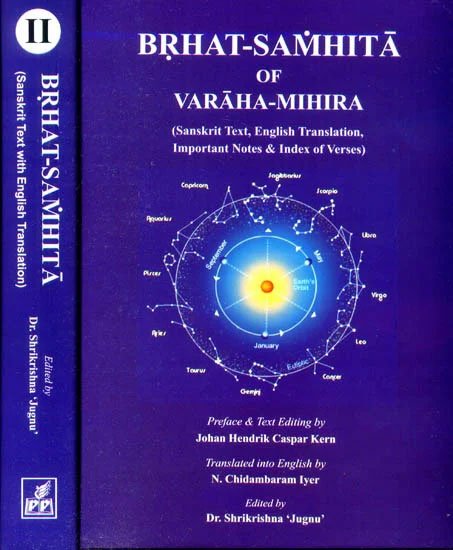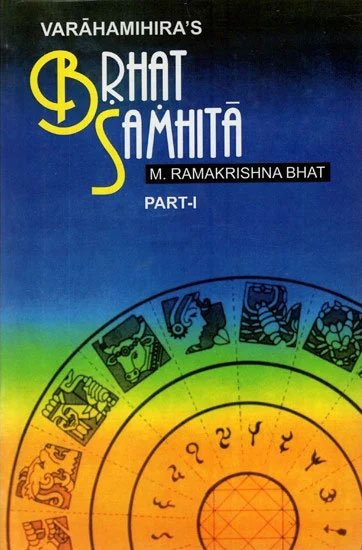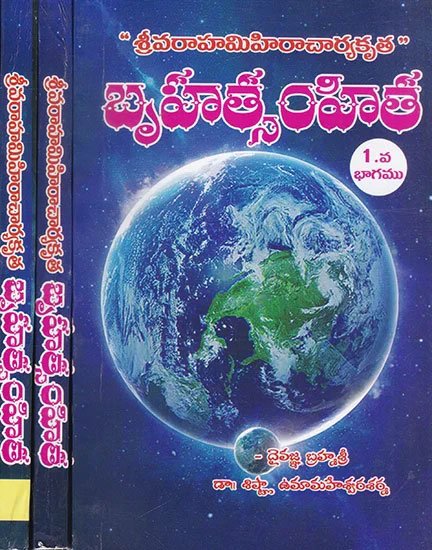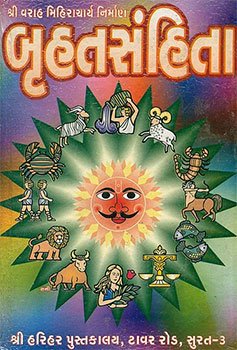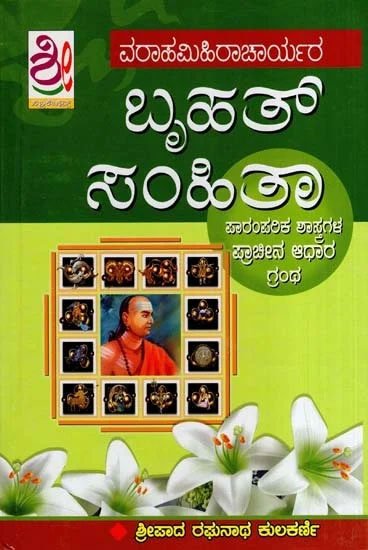Brihat-samhita [sanskrit]
26,560 words
The Sanskrit text of the Brihat-samhita from the 6th-century authored by Varaha Mihira in present-day Ujjain, India. It primarily deals with astrology and astronomy but is presented as an encyclopedia of knowledge.
Verse 73.3
आकारं विनिगूहतां रिपुबलं जेतुं समुत्तिष्ठतां तन्त्रं चिन्तयतां कृताकृतशतव्यापारशाखाकुलम् ।
मन्त्रिप्रोक्तनिषेविणां क्षितिभुजामाशङ्किनां सर्वतो धुःखाम्भोनिधिवर्तिनां सुखलवः कान्तासमालिङ्गनम् ॥ ३ ॥
[निसेविणाम् । निषेविनाम्]
ākāraṃ vinigūhatāṃ ripubalaṃ jetuṃ samuttiṣṭhatāṃ tantraṃ cintayatāṃ kṛtākṛtaśatavyāpāraśākhākulam |
mantriproktaniṣeviṇāṃ kṣitibhujāmāśaṅkināṃ sarvato dhuḥkhāmbhonidhivartināṃ sukhalavaḥ kāntāsamāliṅganam || 3 ||
[niseviṇām | niṣevinām]
The Sanskrit text of Verse 73.3 is contained in the book Brihata Samhita (Sanskrit Text with Hindi Translation) by Pandit Achyutananda Jha. This book is available online or you could buy the latest edition:
Read online Buy now! The Sanskrit text by Pandit Achyutananda Jha (2001)
Glossary of Sanskrit terms
Note: This extracts Sanskrit terms and links to English definitions from the glossary, based on an experimental segmentation of verse (73.3). Some terms could be superfluous while some might not be mentioned. Click on the word to show English definitions.
Akara, Guhat, Ripubala, Samud, Tishthat, Tantra, Kritakrita, Shata, Vyapara, Shakha, Akula, Mantrin, Mantri, Prokta, Nishevin, Kshitibhuj, Ashankin, Sarvatah, Sarvata, Dhu, Kha, Bha, Bhu, Vartin, Sukhalava, Kanta, Samalingana, Sevi, Sevin,
Analysis of Sanskrit grammar
Note: this is an experimental feature and only shows the first possible analysis of the Sanskrit text (Verse 73.3). If the system was successful in segmenting the sentence, you will see of which words it is made up of, generally consisting of Nouns, Pronouns, Verbs, Participles and Indeclinables. Click on the link to show all possible derivations of the word.
- Line 1: “ākāraṃ vinigūhatāṃ ripubalaṃ jetuṃ samuttiṣṭhatāṃ tantraṃ cintayatāṃ kṛtākṛtaśatavyāpāraśākhākulam ”
- ākāram -
-
ākāra (noun, masculine)[adverb], [accusative single]
- vini -
-
vi (noun, neuter)[locative single]vī (noun, neuter)[locative single]vini (Preverb)[Preverb]
- gūhatām -
-
√guh -> gūhat (participle, masculine)[genitive plural from √guh class 1 verb]√guh -> gūhat (participle, neuter)[genitive plural from √guh class 1 verb]√guh (verb class 1)[imperative active third dual], [imperative middle third single]
- ripubalam -
-
ripubala (noun, neuter)[adverb], [nominative single], [accusative single]
- jetum -
-
√ji -> jetum (infinitive)[infinitive from √ji]√ji -> jetum (infinitive)[infinitive from √ji]
- samut -
-
samud (noun, masculine)[compound], [adverb], [nominative single], [vocative single]samud (noun, neuter)[compound], [adverb], [nominative single], [vocative single], [accusative single]
- tiṣṭhatām -
-
√sthā -> tiṣṭhat (participle, masculine)[genitive plural from √sthā class 1 verb]√sthā -> tiṣṭhat (participle, neuter)[genitive plural from √sthā class 1 verb]√sthā (verb class 1)[imperative active third dual], [imperative middle third single]
- tantram -
-
tantra (noun, neuter)[adverb], [nominative single], [accusative single]tantrā (noun, feminine)[adverb]
- cintayatām -
-
√cint (verb class 10)[imperative active third dual], [imperative middle third single]
- kṛtākṛta -
-
kṛtākṛta (noun, masculine)[compound], [vocative single]kṛtākṛta (noun, neuter)[compound], [vocative single]
- śata -
-
śata (noun, neuter)[compound], [vocative single]
- vyāpāra -
-
vyāpāra (noun, masculine)[compound], [vocative single]
- śākhā -
-
śākha (noun, masculine)[compound], [vocative single]śākha (noun, neuter)[compound], [vocative single]śākhā (noun, feminine)[nominative single]√śākh (verb class 1)[imperative active second single]
- akulam -
-
akula (noun, masculine)[adverb], [accusative single]akula (noun, neuter)[adverb], [nominative single], [accusative single]akulā (noun, feminine)[adverb]
- Line 2: “mantriproktaniṣeviṇāṃ kṣitibhujāmāśaṅkināṃ sarvato dhuḥkhāmbhonidhivartināṃ sukhalavaḥ kāntāsamāliṅganam || 3 |”
- mantri -
-
mantri (noun, masculine)[compound], [adverb]mantrin (noun, masculine)[compound], [adverb]mantrin (noun, neuter)[compound], [adverb], [nominative single], [vocative single], [accusative single]mantrī (noun, masculine)[adverb], [vocative single]mantrī (noun, feminine)[compound], [adverb], [vocative single]mantrī (noun, neuter)[compound], [adverb], [nominative single], [vocative single], [accusative single]
- prokta -
-
prokta (noun, masculine)[compound], [vocative single]prokta (noun, neuter)[compound], [vocative single]
- niṣeviṇām -
-
niṣevin (noun, masculine)[genitive plural]niṣevin (noun, neuter)[genitive plural]
- kṣitibhujām -
-
kṣitibhuj (noun, masculine)[genitive plural]
- āśaṅkinām -
-
āśaṅkin (noun, masculine)[genitive plural]āśaṅkin (noun, neuter)[genitive plural]
- sarvato* -
-
sarvataḥ (indeclinable)[indeclinable]sarvata (noun, masculine)[nominative single]
- dhuḥ -
-
dhur (noun, feminine)[adverb]dhu (noun, feminine)[nominative single]
- khām -
-
khā (noun, feminine)[accusative single]
- bho -
-
bha (noun, masculine)[nominative single]bhā (noun, masculine)[accusative plural], [ablative single], [genitive single]bhu (noun, masculine)[vocative single]bhu (noun, feminine)[vocative single]
- nidhi -
-
nidhi (noun, masculine)[compound], [adverb]
- vartinām -
-
vartin (noun, masculine)[genitive plural]vartin (noun, neuter)[genitive plural]
- sukhalavaḥ -
-
sukhalava (noun, masculine)[nominative single]
- kāntā -
-
kāntā (noun, feminine)[nominative single]√kam -> kāntā (participle, feminine)[nominative single from √kam class 1 verb]
- samāliṅganam -
-
samāliṅgana (noun, neuter)[adverb], [nominative single], [accusative single]
- Cannot analyse 3
- Line 3: “[niseviṇām ”
- ni -
-
ni (noun, masculine)[compound], [adverb]ni (noun, neuter)[compound], [adverb], [nominative single], [vocative single], [accusative single]ni (noun, feminine)[compound], [adverb]nī (noun, masculine)[adverb]nī (noun, neuter)[compound], [adverb], [nominative single], [vocative single], [accusative single]nī (noun, feminine)[adverb]
- sevi -
-
sevi (noun, neuter)[compound], [adverb], [nominative single], [vocative single], [accusative single]sevin (noun, masculine)[compound], [adverb]sevin (noun, neuter)[compound], [adverb], [nominative single], [vocative single], [accusative single]
- ṇā -
-
ṇa (noun, masculine)[compound], [vocative single]
- am -
-
a (noun, masculine)[adverb], [accusative single]ā (noun, feminine)[adverb]e (noun, masculine)[accusative single]
Other editions:
Also see the following editions of the Sanskrit text or (alternative) English translations of the Verse 73.3
Brhatsamhita with the Commentary of Bhattotpala
by Krishna Chandra Dwivedi (2016)
Publisher: Sampurnanand Sanskrit University; 1229 pages;
Buy now!
Brihat Samhita with the Commentary of Utpalapatimala of Yogisvara
by K. V. Sharma (2012)
Publisher: Rashtriya Sanskrit Sansthan, Janakpuri; 754 pages; ISBN-10; 8186111360; ISBN-13: 9788186111369
Buy now!
Brihat Samhita (Hindi Translation)
by K. V. Sharma (2002)
Publisher: Sampurnanand Sanskrit University; 2359 pages; ISBN-13: 9789387890008.
Buy now!
Brhat Samhita (English translation)
by N. Chidambaram Iyer (2022)
Publisher: Parimal Publication Pvt. Ltd.; 801 pages; Edited by Dr. Shrikrishna Jugnu; ISBN-10: 8171104215; ISBN-13: 9788171104215.
Buy now!
Brhat Samhita (English with notes)
by M. Ramakrishna Bhat (2010)
Publisher: Motilal Banarsidas Publishers Pvt. Ltd.; 1155 pages; ISBN-10: 8120810600; ISBN-13: 9788120810600.
Buy now!
Brhat Samhita (Telugu translation)
by Sishtla Umamaheswara Sharma (2020)
Publisher: Mohan Publications, Andhra Pradesh; 846 pages.
Buy now!Preview of verse 73.3 in Kannada sript:
ಆಕಾರಂ ವಿನಿಗೂಹತಾಂ ರಿಪುಬಲಂ ಜೇತುಂ ಸಮುತ್ತಿಷ್ಠತಾಂ ತನ್ತ್ರಂ ಚಿನ್ತಯತಾಂ ಕೃತಾಕೃತಶತವ್ಯಾಪಾರಶಾಖಾಕುಲಮ್ ।
ಮನ್ತ್ರಿಪ್ರೋಕ್ತನಿಷೇವಿಣಾಂ ಕ್ಷಿತಿಭುಜಾಮಾಶಙ್ಕಿನಾಂ ಸರ್ವತೋ ಧುಃಖಾಮ್ಭೋನಿಧಿವರ್ತಿನಾಂ ಸುಖಲವಃ ಕಾನ್ತಾಸಮಾಲಿಙ್ಗನಮ್ ॥ ೩ ॥
[ನಿಸೇವಿಣಾಮ್ । ನಿಷೇವಿನಾಮ್]
Brhat Samhita (Gujarati translation)
by - (2000)
Publisher: Shree Harihar Pustakalay, Surat; Author: Shri Varahamihira Acharya (શ્રી વરાહમિહીરાચાર્ય); 432 pages.
Buy now!Preview of verse 73.3 in Gujarati sript:
આકારં વિનિગૂહતાં રિપુબલં જેતું સમુત્તિષ્ઠતાં તન્ત્રં ચિન્તયતાં કૃતાકૃતશતવ્યાપારશાખાકુલમ્ ।
મન્ત્રિપ્રોક્તનિષેવિણાં ક્ષિતિભુજામાશઙ્કિનાં સર્વતો ધુઃખામ્ભોનિધિવર્તિનાં સુખલવઃ કાન્તાસમાલિઙ્ગનમ્ ॥ ૩ ॥
[નિસેવિણામ્ । નિષેવિનામ્]
Brhat Samhita (Kannada translation)
by Sripada Raghunatha Kulkarni (2021)
Publisher: Srinidhi Publications, Bangalore; 668 pages with illustrations.
Buy now!Preview of verse 73.3 in Kannada sript:
ಆಕಾರಂ ವಿನಿಗೂಹತಾಂ ರಿಪುಬಲಂ ಜೇತುಂ ಸಮುತ್ತಿಷ್ಠತಾಂ ತನ್ತ್ರಂ ಚಿನ್ತಯತಾಂ ಕೃತಾಕೃತಶತವ್ಯಾಪಾರಶಾಖಾಕುಲಮ್ ।
ಮನ್ತ್ರಿಪ್ರೋಕ್ತನಿಷೇವಿಣಾಂ ಕ್ಷಿತಿಭುಜಾಮಾಶಙ್ಕಿನಾಂ ಸರ್ವತೋ ಧುಃಖಾಮ್ಭೋನಿಧಿವರ್ತಿನಾಂ ಸುಖಲವಃ ಕಾನ್ತಾಸಮಾಲಿಙ್ಗನಮ್ ॥ ೩ ॥
[ನಿಸೇವಿಣಾಮ್ । ನಿಷೇವಿನಾಮ್]
![Brihat-samhita [sanskrit] - book cover](/uploads/a/Brihat-Samhita-Sanskrit.jpg)
